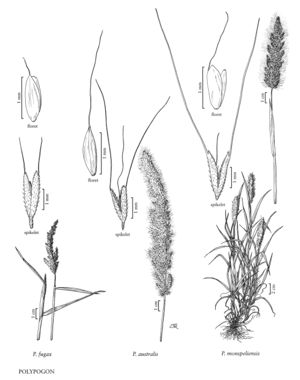Difference between revisions of "Polypogon australis"
FNA>Volume Importer |
imported>Volume Importer |
||
| (2 intermediate revisions by the same user not shown) | |||
| Line 39: | Line 39: | ||
|publication year= | |publication year= | ||
|special status= | |special status= | ||
| − | |source xml=https:// | + | |source xml=https://bitbucket.org/aafc-mbb/fna-data-curation/src/200273ad09963decb8fc72550212de541d86569d/coarse_grained_fna_xml/V24/V24_937.xml |
|subfamily=Poaceae subfam. Pooideae | |subfamily=Poaceae subfam. Pooideae | ||
|tribe=Poaceae tribe Poeae | |tribe=Poaceae tribe Poeae | ||
Latest revision as of 16:26, 11 May 2021
Plants perennial. Culms 20-100 cm. Sheaths smooth to scab¬ridulous; ligules 1-3(4) mm, rounded to broadly acute, erose; blades 13-17 cm long, 5-7 mm wide, scabrous. Panicles 8-15 cm, lobed or interrupted, usually purplish; pedicels absent or vestigial; stipes 0.3-0.5 mm. Glumes 1.5-3 mm, smooth to echinate, margins ciliate, apices acute to truncate, unlobed or lobed, lobes to 0.1 mm, awned, awns (3)4-6 mm, flexuous; lemmas 1-1.3 mm, awned, awns 2-3.5 mm, flexuous; paleas from shorter than to subequal to the lemmas; anthers 0.3-0.5 mm. 2n = unknown.
Distribution
Calif., Ariz., Wash., Nev.
Discussion
Polypogon australis is native to South America. It has become established in western North America, where it grows alongside ditches and streams. The records from Washington and Oregon are from ballast dumps; it is not known from recent collections in those states.
Selected References
None.
